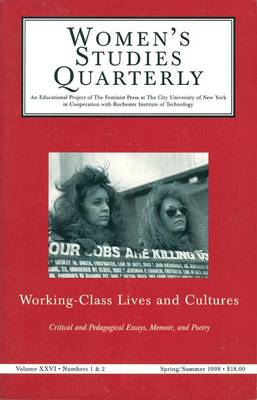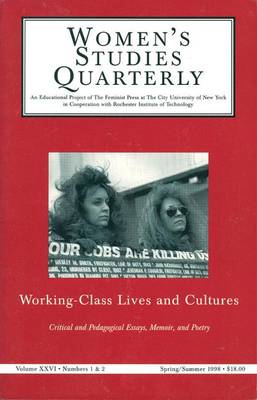
Door een staking bij bpost kan je online bestelling op dit moment iets langer onderweg zijn dan voorzien. Dringend iets nodig? Onze winkels ontvangen jou met open armen!
- Afhalen na 1 uur in een winkel met voorraad
- Gratis thuislevering in België vanaf € 30
- Ruim aanbod met 7 miljoen producten
Door een staking bij bpost kan je online bestelling op dit moment iets langer onderweg zijn dan voorzien. Dringend iets nodig? Onze winkels ontvangen jou met open armen!
- Afhalen na 1 uur in een winkel met voorraad
- Gratis thuislevering in België vanaf € 30
- Ruim aanbod met 7 miljoen producten
Zoeken
Women's Studies Quarterly (98:1-2)
Working Class Studies
€ 19,45
+ 38 punten
Omschrijving
This vital and engaging collection expands and builds upon Women's Studies Quarterly's groundbreaking 1995 volume, honored with an award from the Council of Editors of Learned Journals. The poetry, testimony, analysis, history, and theory collected here, which includes work by Patti See and Janet Zandy, not only suggests connective threads for understanding working-class experiences and literatures but also explores intersections of race, ethnicity, gender, sexual orientation, and class. Such explorations are arranged around the issue's four themes: family, education, the workplace, and identity. From South African sexual relationships, to teaching Medieval studies to working-class students, to the politics of a deaf workers' publication, to poems written in prison, this issue testifies to the growing depth and scope of working-class studies. Essential reading for all interested in the field, this issue offers an invaluable framework for discussing working-class literature, culture, and artistic productions, while also attending to the material conditions of working-class people's lives.
Specificaties
Betrokkenen
- Uitgeverij:
Inhoud
- Aantal bladzijden:
- 256
- Taal:
- Engels
- Reeks:
- Reeksnummer:
- nr. 98
Eigenschappen
- Productcode (EAN):
- 9781558611917
- Verschijningsdatum:
- 1/06/1998
- Uitvoering:
- Paperback
- Formaat:
- Trade paperback (VS)
- Afmetingen:
- 139 mm x 217 mm
- Gewicht:
- 376 g

Alleen bij Standaard Boekhandel
+ 38 punten op je klantenkaart van Standaard Boekhandel
Beoordelingen
We publiceren alleen reviews die voldoen aan de voorwaarden voor reviews. Bekijk onze voorwaarden voor reviews.










